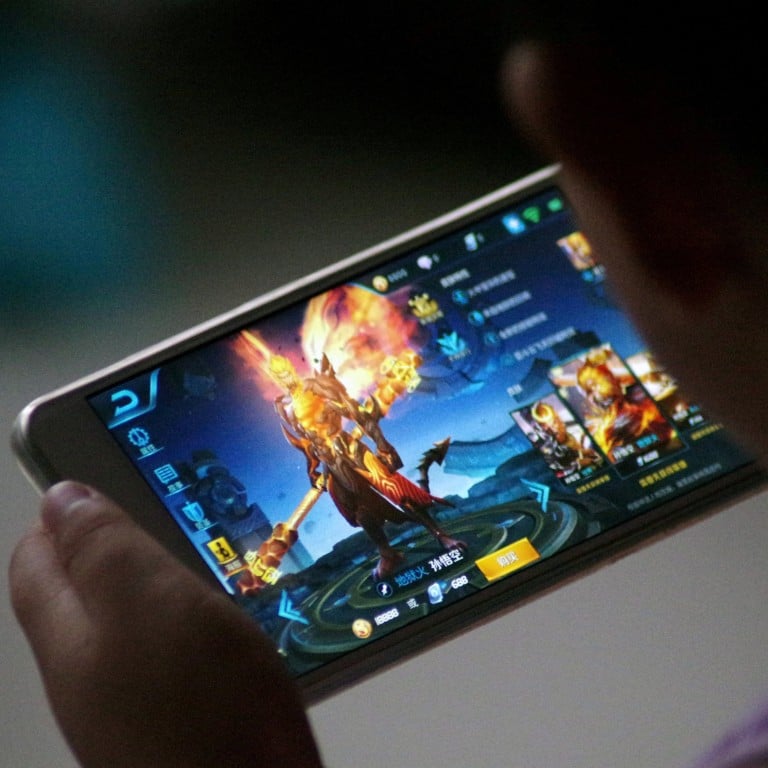
China’s minors face new limits on mobile games in war on gaming addiction
- State censor extends video games rules to mobile titles and introduces age rating system
- Young players must also register with real names and face strict time and spending limits
New anti-addiction guidelines for minors that set out limits for time and money spent on mobile games have been introduced by China’s state censor, following previous calls to curb excessive gaming.
State media published the new rules on Tuesday, which introduced a stricter real-name registration system and, for the first time, an age rating system. The State Administration of Press and Publications (SAPP) guidelines also include limiting gaming to between 8am and 10pm, with no more than 1.5 hours each day – or three hours on holidays – and no more than 400 yuan (US$57) to be spent each month on in-game purchases.
Gaming analyst Daniel Ahmad said the new rules were in line with expectations as many of the limits already existed in computer games and were being extended to mobile titles. He expected the real-name registration and rating system to have the greatest impact on underage players.
“The introduction of a stricter real-name registration and age rating system is certainly new and will have a larger impact given that these systems will be harder for minors to hack or cheat,” said Ahmad, who works for gaming consultancy Niko Partners.
Tencent uses facial recognition to detect minors playing games
Minors make up around 20 per cent of China’s internet users and a smaller percentage of online game players, according to Ahmad. After gaming companies such as Tencent introduced anti-addiction systems in 2018 following government criticism, the worst fears about new regulations had subsided, he said.
SAPP said it was working with the Ministry of Public Security to build a central personal identification system for the gaming industry so companies could verify the identities and ages of users. Companies found to have broken the rules will face a range of penalties, including losing their games publishing licences in the most severe cases.
China’s mobile gaming industry was developing fast and provided entertainment to the public, SAPP said, but it had led to gaming addiction and excessive spending among some minors, sparking public concern and criticism.
“The guideline’s introduction and implementation will strengthen and improve the management of online games. It will protect the physical and mental health of minors and build a healthy internet environment,” a SAPP spokesman said, according to Xinhua.
China introduced anti-addiction rules on computer games for minors in 2007 but mobile games were exempted. Communist Party mouthpiece People’s Daily and Xinhua both criticised Tencent’s popular game Honour of Kings in 2017 for its addictive qualities and called for tighter control of the industry in 2018.
Beijing’s new gaming addiction clinic opens old wounds
The SAPP spokesman said a proposed regulation on online gaming for the protection of minors introduced in 2017 had set out the principles for maintaining a healthy online environment for minors, and it was expected that the anti-addiction guidelines would be drafted into law through these regulations.
Tencent is the world’s largest gaming company, earning 128.4 billion yuan (US$18.3 billion) in 2018 from games, its largest revenue stream. After criticisms from state media, the internet giant introduced anti-addiction measures for 31 titles, including Honour of Kings, according to a company announcement in January this year.
Play time on these titles is limited to one hour for those under 12 and two hours for those aged between 12 and 18, between 8am and 9pm.
Inside China’s battle to keep internet addiction in check
Tencent introduced a spending reminder in June 2018 which sends a notification if an underage player spends more than 500 yuan in 30 days, according to a company statement.
“The guidelines are an important and proactive signal to the entire industry and will provide clearer guidance for our work in the future,” a spokesman from Tencent’s gaming division said in a statement on Tuesday.

